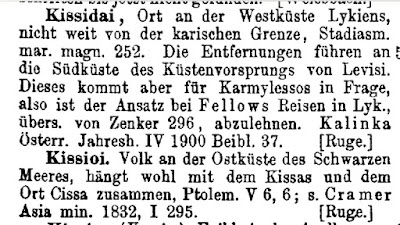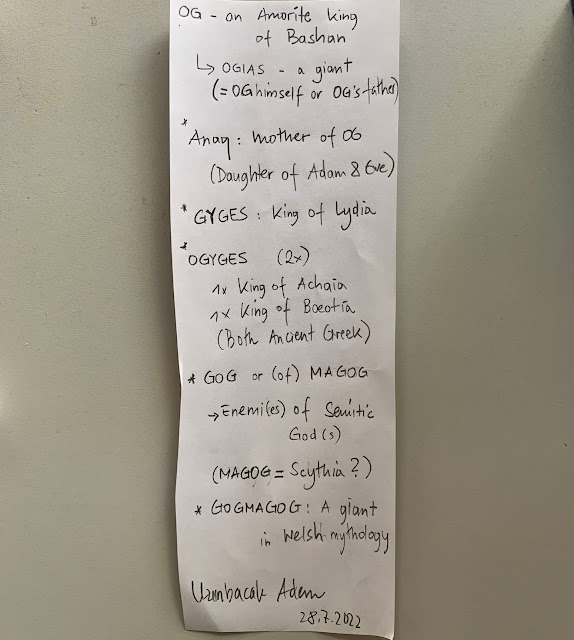 |
| Apollon with Quiver and Arrow - Wikipedia |
 |
| Paulys RE - Pauly's |
*
Apollon'un bir lakabı da Pauly'nin kitabında geçen Kissios.
Apollon birçok sikkenin üzerinde ok ve okluk ile betimlenmiş ve yanına lakabı Kissios yazılmış.
*
Bu Yunanca lakabı (byname) kissios'u Pauly sarmaşık (Almanca Efeu) ile ilişkilendiriyor. Bense diyorum ki, Türkçe kişi/kisi (man, human, person) sözcüğü ve/ya okluk anlamındaki kes/keş/kiş daha çok yakışır.
Karya topraklarındaki bu Alabanda şehrinde bulunan paraların üzerindeki bu Apollo için Yunanca sarmaşık anlamındaki 'κισσός' bağlantısı kuruluyor. Bence o zamanda yaşayan Yunanlılardan bazıları Yunanca olmayan Karya dilini az çok biliyorlardı ve Apollo'yu Türkçe Keş/Kiş/Kis (okluk, QUIVER) ile ilişkilendiriyorlardı. Avcı Apollo (ki daha önce Apollo'daki AB/AP sözcüğünü Eski Türkçe Av anlamındaki AB ile ben ilişkilendirmiştim. Avcı tanrının adında Av sözcüğünün bulunması şaşırtıcı mı?
Bu arada κισσός (Yunanca sarmaşık) da Türkçe'deki bağlamak anlamına gelen kişe- ile uyumludur. > Kişen: Uçkur Bağı (Waistband/cord).
İyi pazarlar!
*
ENGLISH VERSION
Another nickname of Apollo is Kissios, which is mentioned in Pauly's book.
(Apollo is depicted on many coins with arrow and quiver).
He associates these kissios with Pauly ivy (Efeu in German). On the other hand, I say that the Turkish word kişi/kisi (man, human, person) is better suited to kes/keş/kis, which means quiver.
The connection of nickname (byname)'κισσός', which means ivy in Greek, is established for this Apollo on the coins found in this city of Alabanda in Caria. I think some of the Greeks living at that time knew more or less the non-Greek Carian language and associated Apollo with the Turkish Keş/Kiş/Kis (okluk, QUIVER). Apollo the Hunter (which I had previously associated with AB/AP in Apollo with the Old Turkish word for Av (Hunt). Is it surprising that the hunter god has the word Av in his name?
By the way, κισσός (Greek ivy) is also compatible with the Turkish kişe- (to bind, to tie) > Kişen: Waistband/cord.
A nice Sunday!
Uzunbacak Adem




































.jpg)